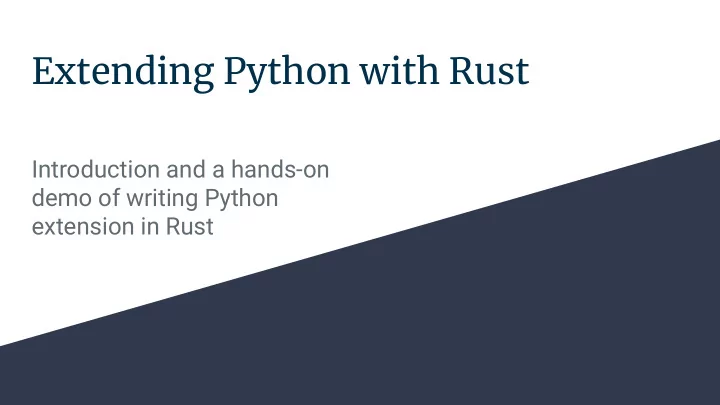

Extending Python with Rust Introduction and a hands-on demo of writing Python extension in Rust
This talk Why? ● ● Why Rust? ● Binginds Dynamic library ● Web service example ● ● Docker example ● Compile and distribute (PIP example)
Why? ● Speed. The dynamic nature of Python means it is notoriously slow at some things, and not great on parallel calculations. Reusability. Why port code when you can use ● it directly? ● Cooperation. If one team writes Python and another - Rust, and they need to use each other's code. Migration. If you want to re-write your entire ● Python codebase to Rust, you could do that module by module.
How? C extension ● Cython - magic! ● ● Numba - JIT-compilation
Why Rust? Rust is an innovative compiled language ● with an accent on safety. ● Rust is one of the most loved languages by developers. ● ...and companies too Minimal runtime (e.g. no garbage ● collector) Yet Rust has a somewhat steep learning curve. In many cases, one may want to split their codebase, and write some critical code in Rust, and some more common code in Python.
Bindings Rust-cpython (which we're going to use ● for the examples) PyO3 - fork of rust-python, only on ● nightly Rust Python as a scripting language in Rust ● programs (not in this talk) Cargo - Rust package manager and CLI ● The Rust book and the Cargo book ●
● Simple Rust code - just two files Dynamic library Will be building a dynamic library - only ● need to set crate-type ● .dll file on Windows, .so on Linux, or .dylib on Mac ● Rust-cpython provides wrappers for Python ● Building for Mac requires additional linker arguments Rename to mylib.so ● ● DEMO
DEMO
Web service More "real-world" example ● ● A Python web-service that calls Rust library and returns the result to user ● Will use Flask + the library we just built Can run it with “FLASK_APP=main.py ● flask run” but for production, we would like more: Continuous Integration/Deployment Will build a Docker image ●
Docker Will use Gunicorn as a web-server ● Will use a multi-stage build ● ● The resulting Docker image will not contain any Rust artifacts - only a compiled binary Will build for Linux this time ● ● DEMO
DEMO
Compile and ● What if we want to keep Rust and Python code separately? distribute ● A Rust team and a Python team ● Corporate PIP repository “pip install mylib” ● ● Setuptools-rust ● Building from source vs wheels ● Can remove the first, Rust stage from our Dockerfile ● DEMO
DEMO
Thanks! https://github.com/moor84
Recommend
More recommend